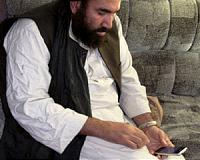| . |  |
. |
Kirkuk, Iraq (AFP) March 3, 2010 The election hopes of Kurdish voters in Kirkuk rest on an American neurologist of Iraqi descent whose mission is to win control of the disputed, ethnically-mixed oil-rich province. Nejm Eddine Karim, a Kurd, returned to his native land from Washington two months ago to contest the election and is staying in the house that Iraq's President Jalal Talabani, himself also a Kurd, has made his campaign HQ. "I propose that an Arab becomes vice president of Kurdistan and a Turkmen is made prime minister, if we succeed in making Kirkuk (240 kilometres, 150 miles, north of Baghdad) part of Kurdistan," said Karim, whose wife and three children have stayed in the US. The 61-year-old physician emigrated to the United States in 1975, having first obtained his medical degree at the University of Mosul, in northern Iraq. He is the number one candidate in Kirkuk for an alliance between Talabani's Patriotic Union of Kurdistan (PUK) and the Kurdish Democratic Party (KDP) of Massud Barzani, president of the autonomous Kurdistan northern region, which is in dispute with Baghdad over oil rights and the sovereignty of Kirkuk. Talabani, who has suffered heart trouble and circulation problems, has travelled to the United States on several occasions to be treated by Karim, who has become his personal physician. According to Karim, "the Arabs and Turkmen will experience a situation a thousand times better than today because their voice will be directly heard among the leaders of Kurdistan," if the province is brought under the northern region's banner, rather than the central government in Baghdad. The decision to select a candidate who left Iraq 35 years ago, however, has raised the eyebrows of some members of the Kurdish community in Kirkuk, which has a mixed population of Kurds, Arabs, Turkmen and Christians. Karim is "a faithful ally of Talabani, who has a book of addresses in the US and there is a consensus among the two big parties to give him an important political position," said Khabab Abdallah, a Kurdish political analyst in the Kurdish region's second city of Sulaimaniyah. For Rafaa al-Marsumi, a fellow analyst based in Kirkuk, Karim is "close to the Americans and a politician of weight for the PUK, which has passed through a period of crisis but retains a popular base of support. Karim's message may be received well by Kurds in Kirkuk, but less favourably by other communities. Since the fall of dictator Saddam Hussein in the 2003 US-led invasion, the province's population has risen from 850,000 to 1.4 million, according to figures collated in September last year by provincial authorities. Around 92,000 families, said to have been displaced under now executed Saddam's Arabisation policy in the 1980s that saw Sunni Arabs arrive as Kurds were driven out, have returned from the Kurdistan region. Turkmen, who believe they are the original inhabitants of Kirkuk, view the influx of Kurds as an invasion, and Assyrian Christians and Arabs want the province to remain a sovereign part of Iraq, rather than Kurdistan. Thirteen parliamentary seats are up for grabs in Kirkuk, and Kurds expect to obtain the majority, although Karim's detractors say the physician's years abroad have left him uneducated about Iraq's chaotic situation. "He could have made his medical skills available to his compatriots instead of arriving with a divisive project," said Omar Khalaf al-Juburi, a candidate for the secular Iraqiya list of former prime minister Iyad Allawi. Ammar Kahia, of the conservative Shiite list of the Iraqi National Alliance (INA), which includes candidates loyal to the radical anti-US cleric Moqtada al-Sadr, accused Karim of adopting "a partisan manner." For the State of Law Coalition of current Prime Minister Nuri al-Maliki, the bottom line is that Kirkuk must remain under Baghdad's control. "Kirkuk should not be annexed," said Sheikh Khairi Nazem al-Assi, a candidate on the list.
Share This Article With Planet Earth
Related Links News From Across The Stans
 Pakistan won't extradite Taliban leader
Pakistan won't extradite Taliban leaderLahore, Pakistan (UPI) Mar 2, 2009 Pakistan will not be sending captured top Afghan Taliban leader Mullah Abdul Ghani Baradar back to Afghanistan, the High Court in Lahore has ruled. Baradar, considered the most influential Taliban leader, second only to Mullah Muhammad Omar, was arrested in Karachi in mid-February in a secret joint operation by Pakistani and U.S. intelligence forces. It was several days after his captur ... read more |
|
| The content herein, unless otherwise known to be public domain, are Copyright 1995-2010 - SpaceDaily. AFP and UPI Wire Stories are copyright Agence France-Presse and United Press International. ESA Portal Reports are copyright European Space Agency. All NASA sourced material is public domain. Additional copyrights may apply in whole or part to other bona fide parties. Advertising does not imply endorsement,agreement or approval of any opinions, statements or information provided by SpaceDaily on any Web page published or hosted by SpaceDaily. Privacy Statement |